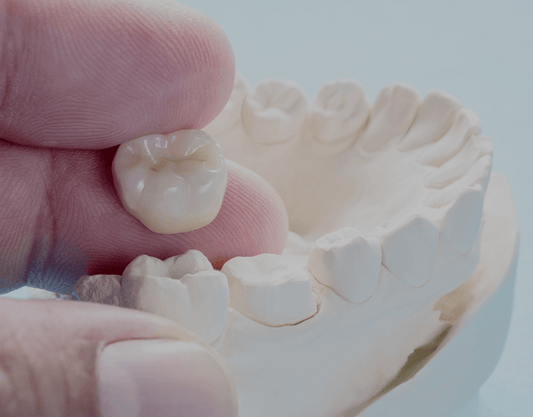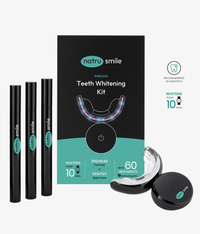
All products are certified by dental expert Dr. Greg Grillo
If your teeth have been damaged – structurally or cosmetically – a dental crown might be the best option for restoring them to their original, pearly state.
Patients receive dental crowns both out of medical necessity and aesthetics, hoping to improve their smile as best they can. But it’s no secret that dental care can be expensive.
For those without insurance, the cost of dental crowns and restorations can be daunting. The cost becomes far more manageable with dental coverage, but how much does it truly cover?
In this article, we’ll be taking a look at the cost of dental crowns with and without insurance, as well as how to choose the best plan for your needs. We’ll also cover how different types of crowns can affect the cost, and how to save money on dental procedures.
Are Dental Crowns Expensive?
In short, yes. Dental crowns aren't cheap, and that's because of what they are designed to do.
A dental crown is a restoration that covers the entire visible part of a tooth, and requires significant labor to create. They're used for a variety of reasons, like restoring a broken or damaged tooth, covering a discolored one, or even holding a dental bridge in place.
Because of this, the cost of permanent dental crowns sits anywhere between $800 and $2500. Permanent crowns last about 15 years, but with proper maintenance, they can last a decade longer.
Before you receive a permanent dental crown, however, you will likely meet with your dentist at least once prior. After x-raying your tooth and preparing it to hold the crown, your dentist will make an impression of your teeth.
While a crown – shaped to fit your mouth perfectly – is being made from the mold, your tooth needs to be protected. The dentist will apply a temporary crown as a placeholder, meant only to protect the tooth until the permanent replacement arrives.
These temporary, low-cost dental crowns range anywhere from $200 to $700, and are only meant to last until your next appointment. The crowns are made from acrylic and can be easily chipped or broken.
From there, the cost of your crown will depend on the type you choose – with insurance or without.
Factors That Affect The Dental Crown Cost
The variation in dental crowns' pricing isn't arbitrary. A plethora of factors determine a crown's price, but generally speaking, the average cost comes down to the following:
Location
This doesn't just refer to where the dentist's office is located (though you may need to factor in travel expenses if you'll be commuting a significant distance). It also applies to where in your mouth the crown will be placed.
Because it's difficult to work on certain areas of the mouth, crowns in these locations may have a great price, and the same goes for teeth that are difficult to reach.
Size And Shape
As previously mentioned, size and shape can also affect the cost of a dental crown. Few things are really "one-size-fits-all," and dentistry is no exception.
The size of the crown is important when it comes to pricing. Most dental crowns are around .5-2mm in thickness, but some might need to be larger (or smaller) depending on how strong and durable they need to be for your particular situation.
You might need something slightly different than the traditional "cap" design for dental crowns, which can add to the cost. For example, if your crown needs to be shaped like a tooth with a wider surface area or multiple points of contact, it may require more materials and labor to complete.
If you need special features (such as porcelain veneers) these costs will also be factored into the total. Your dentist may need to make a unique crown to suit your teeth – which can drive up the price if they are especially large or oddly shaped.
Alternatively, you may need to cover multiple teeth in a row to create a bridge. This type of restoration can also demand additional resources, resulting in an increase in cost for the entire procedure.
Crown Material
The cost of a dental crown can also vary depending on the type. There are several different types of materials used to create permanent crowns, and each has its own advantages and disadvantages. Some of these materials include:
-
Metal: All-metal dental crowns are made from materials such as gold, palladium, or nickel-chromium alloy. While strong and durable, these crowns aren’t as aesthetically pleasing since they don’t match the color of your other teeth.
-
Ceramic: All-ceramic dental crowns are made entirely out of porcelain and can be difficult to tell apart from authentic teeth. When it comes to metal crowns vs porcelain dental crowns, metal crowns are considerably stronger and more durable than porcelain.
-
Porcelain/metal: Porcelain-fused-to-metal (PFM) dental crowns combine metal with a porcelain coating for strength and are one of the most popular types of crowns. They’re usually less expensive than all-porcelain crowns and can be matched to your other teeth for a natural look.
-
Zirconia: These crowns are made from zirconium oxide, an extremely strong material that is both stain-resistant and aesthetically pleasing. Like all ceramic crowns, they can be matched to the color of your other teeth.
-
Gold: Typically made from gold alloy or high noble metal with gold
content, gold crowns are the strongest type of restoration. Their durability and aesthetic make them the priciest of the bunch, as well.
The cost of your dental crowns will depend on the type of crown you choose and whether or not you have insurance. In most cases, insurance will cover at least part of the cost, so it pays to do research on your policy before making a decision.
Dentist's Skill And Experience
Lastly, the cost of your dental crown may also vary depending on who you go to. For example, an experienced dentist will likely be more expensive than one with fewer years in practice. This is not inherently a bad thing, though – a more experienced professional will likely make fewer mistakes when working on your teeth.
Additionally, dentists who specialize in cosmetic dentistry or prosthodontics might have higher rates than general practitioners. If you're looking to get a particular type of crown-like veneers or all-porcelain crowns – it may be best to seek out a specialist for the job.
Cost Of Dental Crowns – Breaking It Down By Crown Type
Now that we've covered what affects the cost of a dental crown, let's take a look at the estimated prices for each type.
Porcelain-Fused-To-Metal (Pfm)
This is one of the most popular types of crowns available today. Their durability and authentic appearance make them an ideal choice for many dentists and patients alike. The average cost ranges from $800 to $2400 per tooth (usually closer to $1100), depending on location and other factors we discussed earlier.
All-Ceramic/Porcelain Dental Crowns
These crowns offer a realistic look and feel, as they’re made from porcelain. They are also more stain-resistant than PFM crowns and can be matched to the color of your other teeth for a seamless finish. The cost of these is slightly higher than PFM – ranging from $1,000 to $2,500 per tooth.
Gold Crowns
The strongest type of restoration available, gold crowns can last as long as 40 years with proper maintenance. While more expensive (averaging about $2500+ per tooth), they are worth it for those who need an option that’s built to last.
Zirconia Crowns
Zirconia crowns offer the strength and durability of gold, but with a more natural-looking finish. They cost between $1000 to $2500 per tooth – usually the same price as ceramic or porcelain – making them slightly less expensive than their gold counterparts.
How Much Do Dental Crowns Typically Cost With Insurance?
The cost of dental crowns with insurance can vary greatly – but most plans will cover at least a portion of the procedure. For example, some plans may offer up to 80% coverage for basic services such as crowns and bridges, while others provide comprehensive coverage depending on your needs.
It's best to check with your plan provider before scheduling an appointment. Each policy is different, so make sure you understand what is covered and what isn't before you commit to any type of restoration.
Here is what each dental crown material costs (on average) after insurance:
- Porcelain-fused-to-metal (PFM): $280 to $1,000
- All-porcelain/ceramic: $530 to $1870
- Metal/gold: $520 to $1,140
Is It Safe To Apply Cheap Crowns?
Even after insurance, the price of some restorations may seem too high. If you want to save money on your crowns, however, it's important to remember that cheaper isn't always better.
Cheap crowns are usually made with lower-grade materials and may not be as durable or long-lasting as more expensive dental restorations. Additionally, they may not fit properly in your mouth, leading to other issues down the line, like dental crown pain.
It's best to speak with your dentist before making any decisions about which type of crown is right for you – especially if you need a cheaper option.
Can I Use My Hsa Or Fsa To Pay For Dental Crowns?
Yes! If you have a Health Savings Account (HSA) or Flexible Spending Account (FSA), you can use it to pay for all or part of your dental crowns. Both of these accounts are pre-tax and allow you to set aside money specifically for health care costs.
HSAs and FSAs are great ways to save on medical expenses, including dental procedures like crowns. Just make sure that the procedure is eligible before using the funds – not all HSAs will cover cosmetic dentistry, so be sure to check with your plan provider.
Are Molar Crowns More Affordable than Front Teeth Crowns?
While crowns designed for front teeth are visible (and, therefore, more detailed), they will typically cost less than crowns that need to be placed further back. However, the shape of the crown may have a greater impact on the price if it's significantly larger sized or oddly shaped.
Molars, for example, are more difficult to work on and may require additional labor. If a crown needs to be placed in an area with greater access issues (like the back of your mouth), the cost may be higher than if it were placed somewhere easier to reach.
Aftercare Costs
Finally, there are a few additional costs to keep in mind when it comes to the cost of dental crowns.
The first is that you will likely need at least one follow-up appointment after your initial visit. During this appointment, your dentist will make sure that the crown fits correctly and check for any signs of infection or decay.
These follow-up visits typically range from $50-$200, but may cost more depending on what is needed during the appointment.
You'll also need to factor in any additional costs associated with maintaining your crowns. This includes regular cleanings, X-rays and checkups to ensure that your crowns remain in good condition. These may seem daunting, but before insurance, it's rare that any of these forms of maintenance cost over $1000.
No matter what route you take, make sure to research your options and speak with your dentist about the best treatment for your needs – both financially and medically. With the right coverage or payment plan in place, dental crowns don’t have to break the bank.










